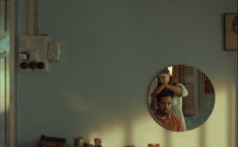Review: Anita (2020)
Anita is an eye-openingy study of male-femele relationships crushed under the burden of patriarchal norms. The film competes in Orizzonti Short programme of the 77the edition of Venice Film Festival.

Anita is an eye-openingy study of male-femele relationships crushed under the burden of patriarchal norms. The film competes in Orizzonti Short programme of the 77the edition of Venice Film Festival.

lorent Morin’s meticulously precise compositing makes the images dance in vibrant tempo, and the script written with greatest care transfers us back to our previous selves, vulnerable, but honest to the questions of life and death, the unconditional love and the awkward period of solitude in our desperation.

What is striking about the film is its smoothly built erotic tension, free of exaggerations.

In her script written for the film, Saffon is very peculiar about showing many faces of the environment she had placed her protagonists in.

What starts as a simple walk to the supermarket ends in a heartbreaking contemporary tale of human, work-related drama.

Laurynas Bareisa shows to which extent the human ability to show empathy, or to be generally shocked by atrocities has weakened.

Gender roles, social issues and the mighty discrepancy between the small catholic community and its biggest source of income, it all comes together in a skillfully rounded short documentary.

The story penned and directed by Irmak Karasu benefits from its completely female perspective, driving over a couple of taboos such as nudity of aged, imperfect bodies, facial hair and the natural curiosity about one’s own naked image.

The archive footage is connected with vignettes dedicated to the key members of Kalas Group, shot in vintage style and masterly edited to a a smooth-flowing story of strong friendships and clever, humor-loaded, performance-filled battle against politics of hate and intolerance of minorities.
Enter your name, email address and a message.
